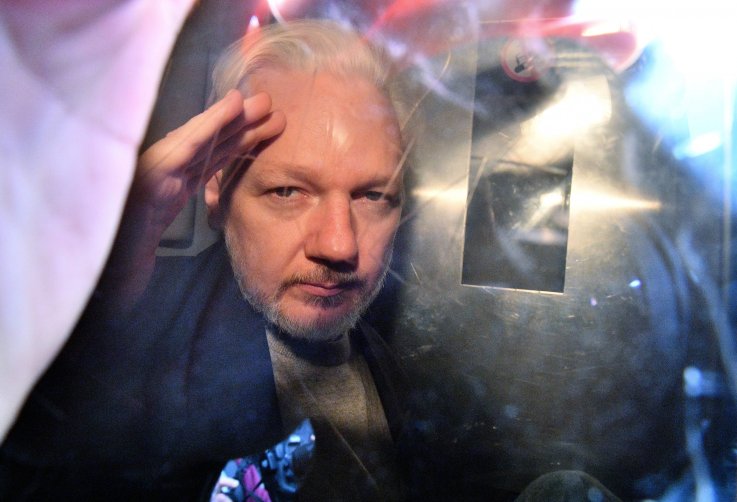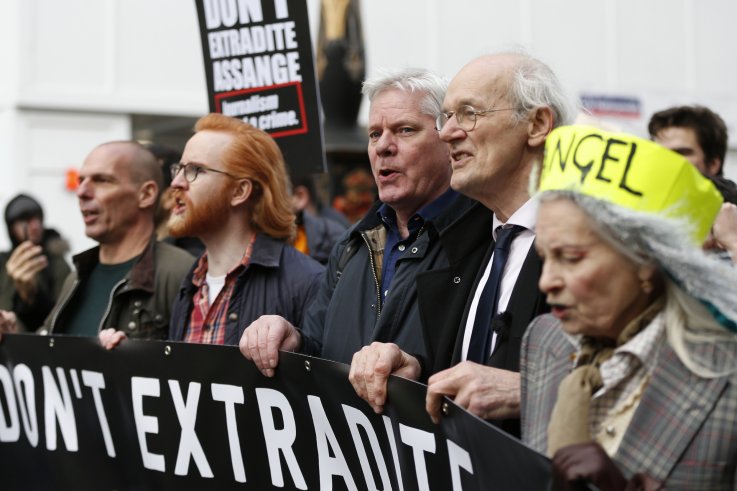BY JASON MURDOCK ON 2/24/20
VIDEO
Julian Assange - What Happens Next?
The editor-in-chief of WikiLeaks has blasted what he calls "hollow words" pushed by the U.S. during its opening arguments for the extradition hearing of Julian Assange today.
Speaking to the media at Woolwich Crown Court, at times drowned out by chanting supporters, Kristinn Hrafnsson suggested there was nothing new in the U.S. argument and teased "the real news" would come out later this week when the defense outlines its evidence.
WikiLeaks Editor Says Julian Assange Extradition Is About Politics Over Law
READ MORE
He said: "The words that are coming out from the United States about WikiLeaks revelations in 2010 and 2011 were hollow 10 years ago, and they don't increase in legitimacy as years go by. On the contrary, those are hollow words. There is nothing to back it up.
"What we are seeing here is simply journalism on trial. It is a shameful thing that we should be defending journalism in a court of law in this country."
In court, James Lewis QC, who is representing the U.S. government, reiterated the list of allegations previously made in the U.S. indictment, and referenced numerous legal arguments previously produced during the trial of Chelsea Manning in 2013.
According to reporter James Doleman, it was again noted WikiLeaks documents were found at Osama Bin Laden's property when it was raided by the U.S in 2011, while Lewis maintained the potential U.S. jail term of 175 years, as claimed by WikiLeaks, was "hyperbole."
"This is an extradition hearing, not a trial," Lewis said, the AP reported. "The guilt or innocence of Mr. Assange will be determined at trial in the United States, not in this court."
The hearing also heard the allegation that human sources who gave information to the U.S. had "disappeared" after the release of files by the website, The Guardian reported.
"The U.S. is aware of sources, whose unredacted names and other identifying information was contained in classified documents published by WikiLeaks, who subsequently disappeared, although the U.S. can't prove at this point that their disappearance was the result of being outed by WikiLeaks," Lewis said, claiming the leaked files put those people at risk.
Tristan Kirk, court reporter for the Evening Standard, reported Assange at one point said that he was "having difficulty concentrating" due to noise from protestors outside. "I'm very appreciative of public support, I understand they must be disgusted," Assange said.
In the lunch break, WikiLeaks' Hrafnsson rejected the claims by the U.S. government that its disclosures caused harm or put human sources at risk of identification.
"What we heard this morning was more of the same, the same thing we have been hearing for 10 years... [that] 'we are putting lives at risk.' And now, 10 years later, there is no evidence of such harm. To the contrary, Pentagon officials were forced to admit in the Manning trial in 2013 that nobody had been physically harmed because of these revelations," he said.
"Now, in 2020, they are in court not able to present a single [piece of] evidence of that harm. Still they go on...why aren't we discussing the harm that was revealed by the releases?"
After the short break, WikiLeaks' defense argued the extradition request is politically motivated and said claimed U.S. politician Dana Rohrabacher offered Assange a "full pardon in exchange for 'personal services,' on behalf of [president] Donald Trump," according to Doleman.
WikiLeaks was being represented by Edward Fitzgerald QC.
Breaking #Assange Defence counsel says a Republican congressman visited Assange and offered him a full pardon in exchange for "personal services," on behalf of Donald #Trump— James Doleman (@jamesdoleman) February 24, 2020
Assange lawyer expanding on claims US Repub congressman offered Trump pardon in exchange for saying Russia not involved in leaking DNC emails
Dana Rohrabacher said to have described it as "win win" situation.. Assange could get out of Ecuadorian embassy and get on with life"— Ben Quinn (@BenQuinn75) February 24, 2020
The extradition proceedings are taking place across two separate hearings inside Woolwich Crown Court, and are expected to span several months. The first hearing started today and runs until February 28. The second is currently set to take place between May 18 and June 5.
Ultimately, a ruling is not expected for months after the last court date, and the British government would make the final decision if extradition is greenlit, The Associated Press reported. If it goes ahead, it has been estimated that Assange will be facing up to 175 years in prison.

WikiLeaks founder Julian Assange gestures from the window of a prison van as he is driven out of Southwark Crown Court in London on May 1, 2019.DANIEL LEAL-OLIVAS/AFP/GETTY
In May, the WikiLeaks founder was named in an 18-count indictment linked to the release of documents obtained from former U.S. Army intelligence analyst Manning.
The filing alleges Assange "conspired" with Manning, and describes the fallout as "one of the largest compromises of classified information in the history of the United States."
Prosecutors have alleged the documents contained unredacted names of human sources and accused Assange of risking "serious harm to United States national security." They do not say Assange did any hacking, instead claiming he "solicited" classified information. They also do not reference disclosures made during the 2016 U.S. presidential election.
Instead, the allegations date to 2009, and specifically reference the leaking of activities reports linked to the wars in Afghanistan and Iraq, alongside 250,000 Department of State cables. The U.S. government rejected the assertion that Assange was acting as a journalist.
But that's exactly what his supporters argue, stressing that the ongoing extradition hearings are a grave threat to press freedoms around the world. Those with inside knowledge of WikiLeaks say the motivations behind the proceedings are political in nature, and not based in law.
Assange, 48, has been incarcerated at H.M. Prison Belmarsh since last April, after about seven years in the Ecuadorian embassy under political asylum. The American Civil Liberties Union (ACLU) blasted the U.S. extradition request as "unprecedented and unconstitutional."
Christine Assange, the leaker's mother, said on Twitter Sunday the case marked the "David and Goliath fight of our generation." She wrote: "Between the world's superpower & the journalist who dared publish proof of its war crimes. The outcome will decide his fate."
Protests in support of Assange popped up in London the weekend prior to the hearings, with speakers including Pink Floyd's Roger Waters and designer Vivienne Westwood.
Last week, two Australian politicians traveled to the city to speak out in support of the founder, as British Labour Party leader Jeremy Corbyn renewed his extradition opposition. At the same time, WikiLeaks editor-in-chief Hrafnsson said U.S. motives were murky.
"It is absolutely certain in my mind there is an overwhelming argument for the dismissal of this extradition request," he said at a Foreign Press Association (FPA) event.
"If it was simply a case which was decided upon with the merit of the laws, I wouldn't worry at all, but this is a political case," Hrafnsson added. "And what's at stake is not just the life of Julian Assange, who faces 175 years in prison if extradited, it is the future of journalism."

In May, the WikiLeaks founder was named in an 18-count indictment linked to the release of documents obtained from former U.S. Army intelligence analyst Manning.
The filing alleges Assange "conspired" with Manning, and describes the fallout as "one of the largest compromises of classified information in the history of the United States."
Prosecutors have alleged the documents contained unredacted names of human sources and accused Assange of risking "serious harm to United States national security." They do not say Assange did any hacking, instead claiming he "solicited" classified information. They also do not reference disclosures made during the 2016 U.S. presidential election.
Instead, the allegations date to 2009, and specifically reference the leaking of activities reports linked to the wars in Afghanistan and Iraq, alongside 250,000 Department of State cables. The U.S. government rejected the assertion that Assange was acting as a journalist.
But that's exactly what his supporters argue, stressing that the ongoing extradition hearings are a grave threat to press freedoms around the world. Those with inside knowledge of WikiLeaks say the motivations behind the proceedings are political in nature, and not based in law.
Assange, 48, has been incarcerated at H.M. Prison Belmarsh since last April, after about seven years in the Ecuadorian embassy under political asylum. The American Civil Liberties Union (ACLU) blasted the U.S. extradition request as "unprecedented and unconstitutional."
Christine Assange, the leaker's mother, said on Twitter Sunday the case marked the "David and Goliath fight of our generation." She wrote: "Between the world's superpower & the journalist who dared publish proof of its war crimes. The outcome will decide his fate."
Protests in support of Assange popped up in London the weekend prior to the hearings, with speakers including Pink Floyd's Roger Waters and designer Vivienne Westwood.
Last week, two Australian politicians traveled to the city to speak out in support of the founder, as British Labour Party leader Jeremy Corbyn renewed his extradition opposition. At the same time, WikiLeaks editor-in-chief Hrafnsson said U.S. motives were murky.
"It is absolutely certain in my mind there is an overwhelming argument for the dismissal of this extradition request," he said at a Foreign Press Association (FPA) event.
"If it was simply a case which was decided upon with the merit of the laws, I wouldn't worry at all, but this is a political case," Hrafnsson added. "And what's at stake is not just the life of Julian Assange, who faces 175 years in prison if extradited, it is the future of journalism."

Wikileaks editor-in-chief Kristinn Hrafnsson, Julian Assange's father, John Shipton, and fashion designer, Vivienne Westwood, march together on February 22, 2020 in London, England.
No comments:
Post a Comment